
SUPRECARB: Large volumes of wheat bran, oat hulls and woody biomass are currently overlooked as raw materials – even though they hold something far more valuable
Project period: 01.04.2025 - 31.03.2028
In line with Denmark’s green research strategy, and the circular economy and cascading use of biomass approaches, the SUPRECARB project aims to explore the potential of two agroindustrial sidestreams, wood-based hemicellulose and grain husks, as feedstocks for the innovative production of XOS. Both feedstocks are widely available in the Nordic region and today they are used for bioenergy or animal feed. We’re working on unlocking the potential of complex carbohydrates found in these side streams and converting them into prebiotic ingredients that support digestive health. The food industry is actively seeking these ingredients as they can form the basis of new, functional products.
“We can get far more value out of industrial side streams than we do today. In this project, we cover the entire chain – from biochemical enzyme design to validated processing. That enables us to match industry needs with technologies that not only work in theory but are ready to plug into existing production,”
says Beatriz V. Chambel, bioprocessing specialist at the Danish Technological Institute.
The project will further advance the understanding of enzymatic hydrolysis and autohydrolysis, two widely-used methods of extraction of oligo- and monosaccharide fractions from biobased raw materials. Novel enzymes with enhanced hydrolytic efficiency will be tested for enzymatic hydrolysis, and a comparison and combination of enzymatic and autohydrolysis will be performed to optimize the extraction process. The project will also improve the knowledge of the subsequent membrane-based technologies for the separation and purification of different carbohydrates extracted from these feedstocks.
Two other products will be directly produced as a result of the project: engineered enzymes to be used in the enzymatic hydrolysis and innovative food products (ice cream by Skarø Is and flour and bakery products by Valsemøllen) containing the extracted prebiotic ingredients. For enzyme production, bioengineering will be applied to generate enzymes with higher activity, thus increasing the efficiency of the enzymatic hydrolysis, and the uptake of the desired prebiotics.
It is estimated that the project will generate economic impact for the SUPRECARB partners by upcycling side-streams into valuable prebiotics that can be used as ingredients in food and feed applications. Combined with the development of scalable and robust processes, this will appeal to consumers seeking nutritious and sustainable options. Thus, the project can reduce production costs and open new market opportunities, leading to nutraceutical products that are competitive with currently available commercial prebiotics.
SUPRECARB is an EU-funded collaboration between research institutions and industry partners across Europe – all working to realize the full potential of existing biomass resources. The project is running from the beginning of April 2025 to the end of March 2028. The project is in collaboration with G&G Holding, Skarø is/biosynergy, Valsemøllen and Enzidia.